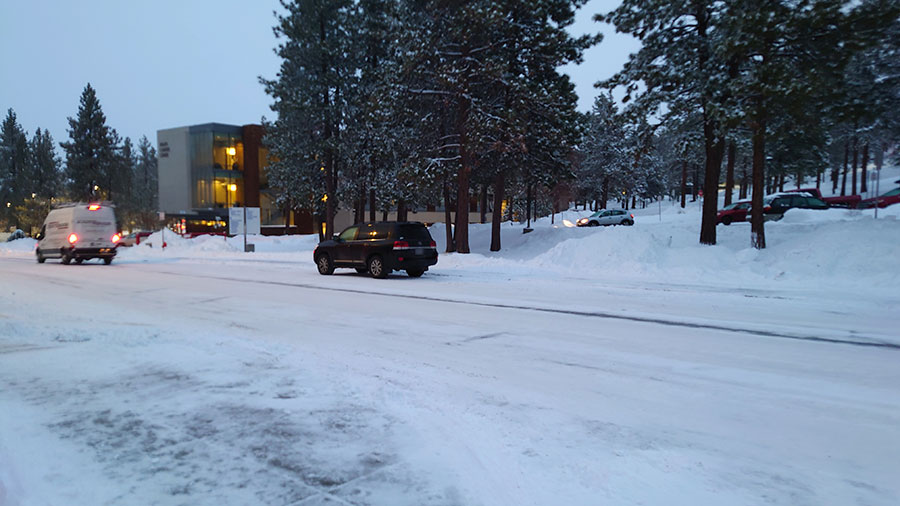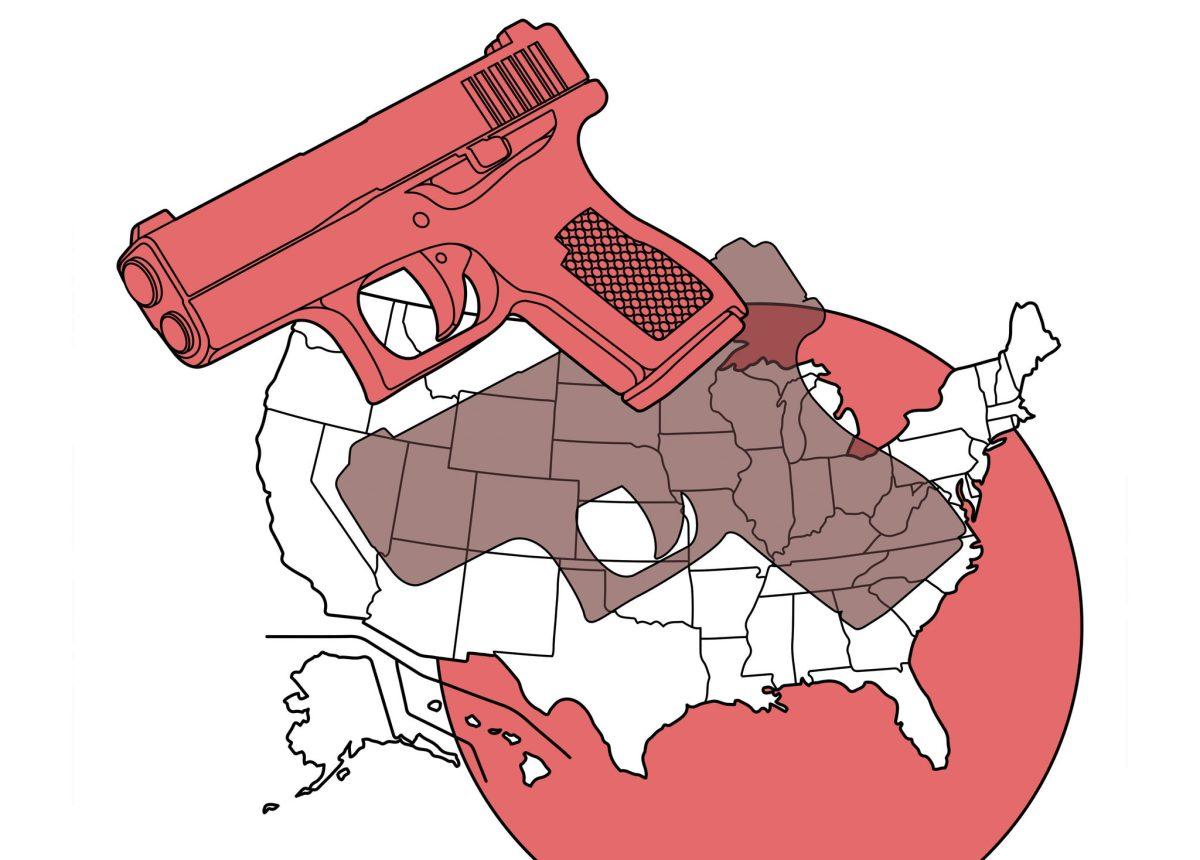“When everyone is typing on
social media, how can you have
any open dialogue when all you
have is a certain amount of
characters to voice yourself to
the world? It’s not productive.”
-Dr. Andria Woodell
psychology professor at Central Oregon Community College
By Katya Agatucci | The Broadside (Contact: [email protected])
When mass shootings are constantly blaring on our tv screen, it’s impossible to not think of some explanation or motive behind these devastating tragedies. Often, the public will think about the perpetrator’s mental status, their political views, history of violence, etc.
Why do we turn to these explanations, though? To partially uncover or try to understand why we do this, a psychological and sociological perspective is needed.
Dr. Andria Woodell, a psychology professor at Central Oregon Community College for 13 years now, provided perspective from a psychological perspective on public and mass shootings or tragedies.
“People want to make sense of the world. We want to establish meaning behind it. When violence happens, it’s really chaotic. We don’t have any predictability with it, so immediately people try to find an explanation for why this person did this,” Woodell explained.
Once people want explanations behind tragedies like the shooting in Las Vegas, people will try to understand by providing explanations such as a mental disorder.
Woodell explained that when people automatically assume it was a mental disorder that caused them to commit that kind of crime, it stigmatizes a large group of people.
“It’s makes people suddenly think that everybody with depression is violent. It can be a piece of what causes that person to do that, but there are a lot of cases when it’s not even a factor. “
“Our society, through a variety of issues, has created a very polarized division between people,” Rebecca Laro, part sociology instructor for COCC and OSU-Cascades for three years now commented.
Laro said that she is not surprised when she hears about public shootings: “It’s not that I’m not sad or upset for the victims when they happen time and again, it’s just that I’ve come to expect it in our society. And because we aren’t taking any social actions to remedy the situation, I find it highly unlikely that it will fix itself.”
Woodell explained that most perpetrators are male, and Laro gave a sociological explanation to that. Laro thinks that people commit mass shootings because of gender socialization in our society.
We, as a country, are a leader in gun deaths and the majority of those shooters are male.
“We stifle men’s emotions when they appear to be “feminine,” so their only recourse is to act ‘masculine.’ And, in our society this masculinity shows itself in hyper-aggressive behavior, and, of course, we ‘reward’ that behavior by idealizing it,” Laro explained, “Feminist theorists would show that we praise men for being aggressive and ridicule them when they act feminine. We’ve all heard the insults: man up, don’t be a sissy, etc. And, through this theory, we know that we’re doing men a disservice by not allowing them to express a full range of emotion without feeling like they are going to be socially stigmatized.”
Through a sociological lens, the feminist theory can be used to explain the creation of the mentality that leads to mass shootings.
As of right now, there has been no explained motive to the shooting in Las Vegas, which is part of why this tragedy is so disturbing to the public, “That makes people really uncomfortable because they can’t get closure.”
In April of 2007, one of the deadliest mass shootings was committed by Seung-Hui Cho, 23 years-old, at the Virginia Polytechnic Institute and University Campus that ended with over 30 people’s lives taken.
According to Woodell, Cho was spiraling down before the shooting had happened, but people weren’t recognizing these behaviors as violent behaviors: “After the fact, all this stuff comes out and we can see the behavior.”
These kinds of tragedies can lead to others having survivor guilt over people trying to understand why they didn’t recognize the behaviors or alert someone when they thought something was off.
“When they [investigators] look at these mass shooters, they’re from all different backgrounds. The only thing that is correlated is that most of them are male. So that raises the question masculinity in our society and what young men today are dealing with,” Woodell stated.
In Woodell’s violence and aggression course that she teaches at COCC, she notes a few common things that shooting perpetrators have in common. They are usually planned, the perpetrators are not psychotic and they don’t have some kind of break with reality, they are law law-abiding citizens and are not on the radar, and they usually have some kind of targeted audience.
Usually, these perpetrators have high hostility and low assertiveness: “They are very angry for whatever reason, yet there are often not assertive. It kind of builds up, they’re not able to express it very well and that is something that correlates with it [motives].
These motives can be anywhere from society itself, an entire gender, their work place, or they could be feeling victimized for some reason.
“The Los Angeles Times” reported that the Isla Vista massacre in May of 2014 by Elliot Rodgers was a year long plan starting in 2013.
Rodgers killed six people before committing suicide near UC Santa Barbara. His guns were also legally purchased, which proves the law abiding citizen part of the common streaks of perpetrators.
Woodell explained that all of these perpetrators might have a weird history or show weird behavior towards others, but “we [the public] are not constantly looking for warning signs because we don’t think that every person is going to be this violent. We might notice that people are struggling, but we might not understand the cues right away.”
“With my students I don’t really talk about how we can predict it but I do talk a lot about bystander intervention. If you do every see a student that has weird patterns or is doing something odd, always report it to someone, like Andrew Davis,” Woodell explained.
If people are willing to speak up about weird behaviors or talk to someone if they are showing signs of hostile behavior, there is a chance that people can intervene before it escalates.
“[Mass shootings] are anomalies, but they aren’t. It’s rising. It’s starting to have bigger counts. You’re starting to see people that you know and are affected by shootings because they have friends or family that was around or in these crisis,” Woodell said.
Woodell stated that at the beginning of each term, it has started to get exhausting discussing a new mass shooting each time.
“I can look at things like bystander effect, bystander intervention, trying to get us to have open conversations with each other that are not hostile, a lot of it is opening up dialogue and trying to hear people’s stories and things like that. That’s usually what I try to do in my classes.”
Woodell also explained that understanding how to empathize with other people who have been through trauma and to make sure to talk through things with people if they are going through something traumatic.
“Some of us are getting to the point where you feel helpless. I don’t want this stuff to make us all feel helpless. I want to encourage all of my students to fight back through this kind of stuff. Through their communication as well as education,” Woodell said.
At COCC, Woodell typically teaches Mind and Brain and Mind and Society as her introductory classes and Positive Psychology, Social Psychology, and Violence and aggression as her specialty courses. She also teaches a variety of psychology skills seminars. For more information about her classes or seminars, contact Woodell at [email protected]. ■
















